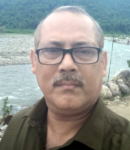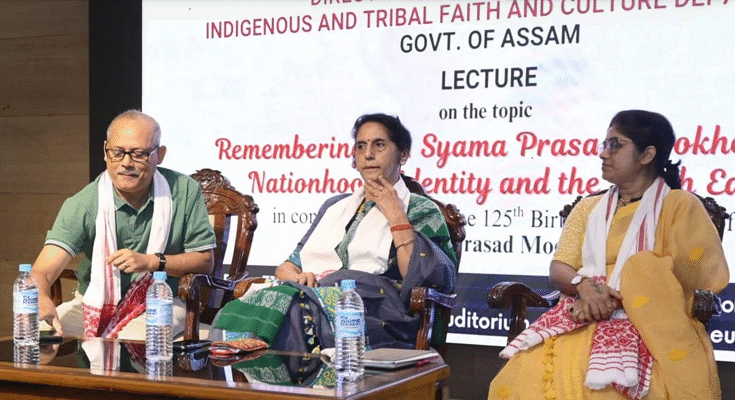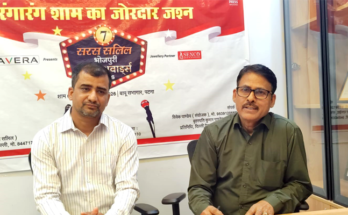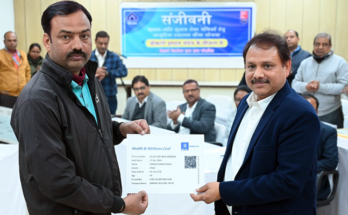 by Nava Thakuria
by Nava Thakuria
One of India’s greatest patriots, educationists, committed politicians and fearless campaigners for national unity and integrity, Dr Syama Prasad Mookerjee was recently remembered for his exceptional contributions to the country in general and Assam in particular. The regional centre of Indira Gandhi National Centre for the Arts in collaboration with Assam directorate of Museums, Indigenous and Tribal Faith and Culture organized the program on 31 July 2025 in the prehistoric city of Guwahati. Chairing the event, Dr Nilima Bhagabati, a retired professor of Gauhati University, termed SP Mookerjee as a courageous son of Bharat, who did not hesitate to speak the truth irrespective of any consequences. The award winning academician in the field of research and a vice-president of Akhil Bharatiya Sikshan Mandal, Prof Bhagabati profoundly stated that Mookerjee sacrificed his life for the unity and integrity of motherland. His clarion call for rejecting two Constitutions and two flags in one country (referring to Jammu & Kashmir) made ripples among the Indians, she asserted, adding that the young people should study and realize the sacrifice of freedom fighters to make India a sovereign nation.
Pursuing a brilliant academic career, Mookerjee became the youngest vice-chancellor of Calcutta University in 1934 at the age of 33. Starting his political career in 1929 as a member of the Indian National Congress, Mookerjee served in both provincial and central governments as minister. Born in a Bengali family of Ashutosh Mookerjee on 6 July 1901, Syama Prasad started practicing as an advocate in Calcutta High Court and subsequently became a barrister. Following the consultation and support from Rashtriya Swayamsevak Sangh (then chief Madhav Sadashiv Golwalkar), he founded the Bharatiya Jana Sangh (mother of current-day Bharatiya Janata Party) in 1951 after deserting Hindu Mahasabha. Married to Sudha Devi, the couple left behind two sons and two daughters.
Gracing the function as the chief guest illustrious Assamese cultural personality Pranjal Saikia paid tributes to Mookerjee for his unconditional support to Assam and Asomiya in a critical juncture of time. Earlier the sacred Bonti (lamp) was lit in front of a Mookerjee’s portrait by the distinguished guests in presence of IGNCA-RC director Dr Sapam Ranabir Singh. Mita Nath Bora, a researcher on Dr Mookerjee, in her speech recollected his role (along with that of Netaji’s elder brother Sarat Chandra Bose) in saving Assam from being included into East Pakistan (now Bangladesh) during the partition. She also added that many Assamese luminaries including Gandhian freedom fighter Pushpalata Das accorded that Assam could have been saved by Gopinath Bordoloi and a few freedom fighters, as Mookerjee supported and strategized the fight at the initial stage. Mookerjee also advocated for Asomiya to be the official language of Assam, added Ms Bora. During his tenure as Calcutta University vice-chancellor, Dr Birinchi Kumar Baruah was appointed as the first Assamese educator in the prestigious university to teach Asomiya.
Mookerjee resigned from the Jawaharlal Nehru-led interim government as a minister, raising his opposition to the 1950 agreement with Liaquat Ali Khan, where it was agreed that J &K would have special status and a separate flag. Later opposing the permit system, Mookerjee marched to the frontier province and subsequently he was arrested. During his days in Srinagar he died under mysterious circumstances on 23 June 1953. No postmortem was carried out and the authority did not allow the body to be carried to New Delhi (rather his mortal remains were directly flown to Calcutta). His mother Jogmaya Devi with many others demanded an inquiry into Mookerjee’s unexplained death. But Nehru did not endorse it.
He was against the partition, but when it became imminent, Mookerjee insisted on retaining Hindu/Sikh majority localities of Bengal and Punjab with India. Demanding strongly to keep the western portion of Bengal (now named as West Bengal/ Paschim Banga) away from the clutches of Muslim League, he saved this Indian State from becoming a part of modern-day Bangladesh. Attending the meeting as a speaker, this writer asserted that credit should go to Mookerjee for West Bengal being an integral part of India and that he should be regarded as the founder of Paschim Banga. Moreover, with the entire Bengal going to East Pakistan, the north-eastern region would have been completely isolated from the rest of India (not even connected by the narrow Siliguri corridor).




